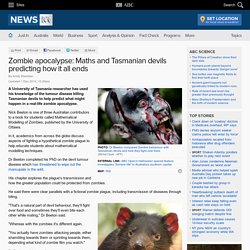

A Blow To The Head Turned This Ordinary Guy Into A Math Genius. Source: www.themindunleashed.org | Original Post Date: May 1, 2014 – 12 years ago, Jason Padgett was a simple 30 year old man from Anchorage, Alaska when he left the university to work in the furniture shop of his father.
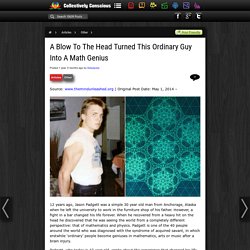
However, a fight in a bar changed his life forever. When he recovered from a heavy hit on the head he discovered that he was seeing the world from a completely different perspective: that of mathematics and physics. Padgett is one of the 40 people around the world who was diagnosed with the syndrome of acquired savant, in which erstwhile ‘ordinary’ people become geniuses in mathematics, arts or music after a brain injury. Padgett, who today is 43 year old, wrote about the experience that changed his life in the autobiographical book “Struck by Genius: How a Brain Injury Made Me a Mathematical Marvel“, which has just released in the U.S. and Britain. Imagery: A Key to Understanding Math. How can teachers help students find the beauty in math?
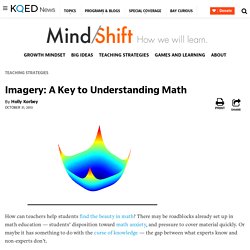
There may be roadblocks already set up in math education — students’ disposition toward math anxiety, and pressure to cover material quickly. Or maybe it has something to do with the curse of knowledge — the gap between what experts know and non-experts don’t. It’s easy for math professors to see the beauty in math, said New York University neuroscientist Pascal Wallisch, because they already have an obvious connection with it. The Surprising Reason Math Anxiety May Be Helpful For Math Learning. We typically think of math anxiety as universally bad for math learning, but a team of scholars have now discovered that the relationship between math anxiety and learning is much more complex.
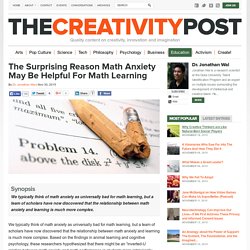
Based on the findings in animal learning and cognitive psychology, these researchers hypothesized that there might be an “inverted-U relation between math anxiety and math performance in students more intrinsically motivated in math, whereas a negative linear relation [would be] observed in those least motivated.” In their paper just published in Psychological Science, Zhe Wang, Sarah Lukowski, Sara Hart, Ian Lyons, Lee Thompson, Yulia Kovas, Michèle Mazzocco, Robert Plomin, and Stephen Petrill sought to test whether this relationship could be uncovered in two independent samples.
These samples were 262 pairs of same-sex twins from the Western Reserve Reading and Math Projects and 237 undergraduates from The Ohio State University. The researchers concluded: Home - The Maths Faculty. The infinite life of pi - Reynaldo Lopes. The Time Everyone “Corrected” the World’s Smartest Woman. By all accounts, Marilyn vos Savant was a child prodigy.

Born in St. Louis, Missouri in 1946, the young savant quickly developed an aptitude for math and science. The unexpected math behind Van Gogh's "Starry Night" - Natalya St. Clair. A few lesson plans exist for teaching visual arts and self-similarity (objects that have the same pattern) that could be used after showing this lesson.
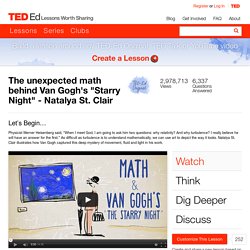
Shodor has some free lesson plans for students in grades 4 through 8. High school students can learn recursion algorithms to create the Koch curve using Scratch for free. Educational technologist Dylan Ryder has also written about creating fractals. A beautiful app worth checking out is Starry Night Interactive App by media artist Petros Vrellis. Download it to your tablet and create your own version of Starry Night. Really interested in mathematics?
How mathematicians are storytellers and numbers are the characters. Mathematicians are storytellers.
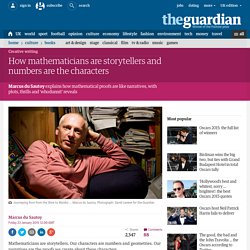
Our characters are numbers and geometries. The Infinite Hotel Paradox - Jeff Dekofsky. The concept of infinity has fascinated humans since ancient times.The first known reference comes from the 5th century B.C.E.
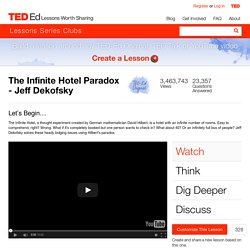
Wikipediapresents many interesting facts and applications of the concepts of both potential infinity (as used in Calculus for example) and actual infinity (as used in Set Theory).Dennis Wildfogel also created an original TED-Ed lesson on the concept of actual infinity. You can watch it here.Another great place to watch videos on infinity and other number related concepts is Numberphile.
Here are a few of their specific videos dealing with infinity, prime numbers, etc.: addition to online resources, there are also some outstanding books dealing with the concept of infinity. Here is a very short list that I would highly recommend:The Infinite Book: A Short Guide to the Boundless, Timeless and Endless by John Barrow The Mystery of the Aleph: Mathematics, the Kabbalah, and the Search for Infinity by Amir D.
The_Joy_of_x - stevenstrogatz. Marcus du Sautoy: Symmetry, reality's riddle. The Neuroscience Lessons of Freestyle Rap. 25 1Share Synopsis What brain scans of rap artists reveal about creativity—and what they do not Even for the wilderness of human thinking, creative ideas seem to be deliberately designed to defy empirical enquiry.
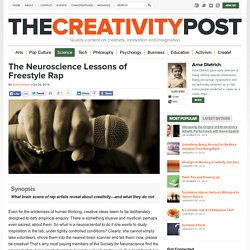
There is something elusive and mystical, perhaps even sacred, about them. So what is a neuroscientist to do if she wants to study inspiration in the lab, under tightly controlled conditions? Zombie apocalypse: Maths and Tasmanian devils predicting how it all ends. By Kristy Sheridan Updated A University of Tasmania researcher has used his knowledge of the tumour disease killing Tasmanian devils to help predict what might happen in a real-life zombie apocalypse.
